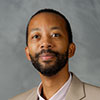This article is more than 5 years old.
From October 15-17, the Digital Library Federation held its annual forum: DLF Forum 2018. This was my second time attending the event, which is regarded as the premier meeting place for digital library, archives, and museum practitioners. Although advertised as being held in Las Vegas, this year’s forum actually took place at the M Resort in Henderson, NV, which is located roughly 20 minutes away from the Las Vegas Strip, and 30 minutes away from downtown Las Vegas.
Keynote
The three-day event was packed with programming, which kicked off with an informative keynote by Anasuya Sengupta. She is the co-director and co-founder of Whose Knowledge?, and has led initiatives across the globe, including the United States, to magnify “marginalized voices in virtual and physical worlds.”
Sengupta’s presentation was entitled “Decolonizing Knowledge, Decolonizing the Internet: an agenda for collective action.” She presented some very interesting statistics, including the ratio between those who create content on the Internet, and those who use content on the Internet.
According to her research, 54 percent of the world is now online. Of those online, 75 percent are from the global South, primarily within Asian nations. However, only around 20 percent of public knowledge is produced on or by people from the global South. The United States and Europe remain the most prominent producers of public content on the Internet, with most of this content published in English. Even with popular sites such as Wikipedia, only 10 percent of editors are female or non-binary, Sengupta revealed.
She said that published and online knowledge “does not look like all of us on the Internet,” and “without calling out the reality, we cannot fix it.” There were three major projects she has worked with in the effort to include more diverse content on the Web: Dalit, Queer Bosnian, and Native American histories.
During the Q&A, an audience member raised the issue of utilizing current classification schemes when describing underrepresented communities, which she said tends to lean toward colonial perspectives. She asked, “How do we work to amplify alternative and indigenous forms of knowledge organization?” Sengupta admitted that she did not have a concrete solution, but added that the fact that we’re asking these types of questions is part of the answer.
Sessions
DLF 2018 had a lot to offer in regards to presentations. The breakout sessions typically included 3-4 presentations on a similar themed topic. The first session I attended, was harmonious with the keynote address: “(Decolonizing) Vocabularies.” One of the presentations, by the University of Illinois Library, shared how they are creating their own digital library metadata aggregation service.
The first day capped off with a session of lightning talks, which included a cool interactive decision tree that can be used to determine RightsStament.org copyright statements for items added to digital collections.
Other sessions throughout the forum I attended included “Collections and/as Data.” I particularly like the presentation by Dean Seeman from the University of Victoria in Canada. He is part of a project where they moved to a new repository and are incorporating Wikidata for describing digital items within their new repository.
Another standout session for me was “Digitization: Pedagogy and Practice.” I particularly liked the “User Directed Scrapbook Digitization” presentation where the Digital Projects Unit at the University of North Texas has gathered patron input to determine best practices when digitizing the often difficult practice of digitizing scrapbooks. I’m looking forward to reading their final report.
An additional ongoing project that I plan to follow was presented at the “Collections and Assessment” session. The presentation was called, “Telling Our Stories: Assessing Reuse in Digital Libraries,” and covered an IMLS-funded project to develop a framework for measuring reuse of objects within digital collections. The group currently completed phase one of the project. It was primarily an assessment to understand how/if institutions are determining reuse of their digital objects, and which features that they would like within a toolkit.
According to their findings, most respondents reported tracking usage of items within their digital collections such as downloads and traffic, but do not have a system to see how the items are being used, such as if it was published in a book or cited in a journal article. The project team is currently applying for another grant that focuses on building the toolkit.
By the numbers, this year’s attendance was less than at last year’s event. Bethany Nowviskie, the director of DLF indicated approximately 650 came out to Nevada, as compared to last year’s record attendance of approximately 800 in Pittsburg. But although attendance from year-to-year may fluctuate, the abundance of innovative projects and ideas shared remain a constant.

8 Comments on ‘DLF Forum 2018 in Las Vegas’
Thanks for sharing — especially the decision tree! Sounds like it was a good meeting.
They keynote sounds like it was really interesting! Great write up!
A sound piece. Thanks for informing us.
Glad you were able to attend and share out for us!
Thanks for summarizing a poignant keynote. DLF sounds like a great conference!
It is interesting to think about the value of assessing re-use of digital objects. In the push to get things up and digitized, it is a paradigm shift to think that its now necessary to determine if the items are getting used, and how often. Fascinating turn of events!
Wow, so much great stuff – I think that RightsStatement decision tree will come in handy for us both. Sounds like a lot of things relevant to your work and some of our work together. Maybe it’s time for me to check out DLF!
Thank you for this report, Mel! I really appreciate your summary of the keynote address–I have added Sengupta to my list of people to read and follow!